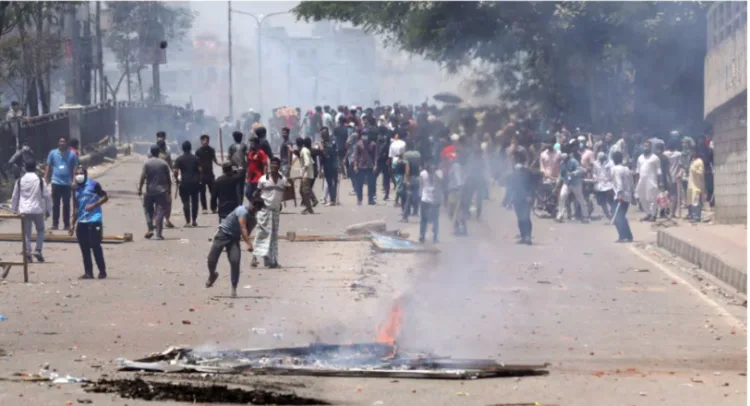As part of the Stop Work Order, the United States State Department suspended funding to riot-torn Bangladesh led by Muhammad Yunus. This follows the decision halting all foreign assistance and pausing new aid under Donald Trump’s new executive order from January 20.
While US backed global aid programmes were halted to all nations, an exception was made in the case of Egypt and Israel. Citing the order on reevaluating and realigning foreign aid, USAID issued a statement to its partners in Bangladesh to stop work performed under its contract.
The halting of the aid from the US will be a huge blow for Bangladesh which is already grappling with an economic crisis. While this aid would be reviewed after a period of 90 days and even in case the US decides to lift the halt, the same would not make much of a difference since Dhaka is already heading for a major economic downfall.
Dark days ahead for Bangladesh
Bangladesh was recently touted to be one of the most promising economies in the world. However bad policy decisions and constant violence amidst an uncertain regime have made matters worse for Bangladesh especially under Yunus.
While the year 2025 would be a struggle, the following year is likely to get worse for the country. The government will be forced to shell out large sums of money for foreign debt management and also repay loans borrowed from local banks.
According to the Economic Relation Division, Bangladesh’s foreign debt servicing surged by 49 per cent year on year. For the first time interest payments crossed the $1 billion mark.
The major problem for Bangladesh would be the repayment of the significant amount of loan it has availed from foreign lending agencies and local banks. Of the total borrowing, 20 per cent is foreign debt while over twice that has been taken from local banks and printing money. These loans will have to be paid in dollars and that has been a short supply of the same in Bangladesh in recent times.
Bangladesh was recently unable to repay a $5 billion import bill for petroleum. This development was witnessed in a country which prided about never having to have failed to repay loans in a timely manner.
The lives of the people and the country’s economy have been disrupted owing to the depreciation of the Taka against the US dollar, energy crisis, high inflation and frequent load shedding.
Further there is no accountability in Bangladesh any longer. With more development projects being taken up, more corruption is being reported. This leads to the cost of development rising considerably. The money that is earned through corruption have been laundered abroad.
A turmoil ridden economy
Since the turmoil began in August last year, nearly 1 million people have lost their jobs. A number of industrial and commercial establishments have shut down due to an acute liquidity crisis. Scores of buying houses that coordinated procurement of readymade garments from local factories for large buyers in the US, UK and EU Nations have closed their offices owing to the turmoil.
Some of the main reasons for such a reaction is due to mob anarchy, rampant extortions, intimidation, threats and a hostile environment which eventually discouraged foreign nations particularly Indians from staying back in the country.
The future is not looking good for the country. The country is surely heading towards an economic collapse. While the experts predict acute famine, there is also a risk to 6.5 million workers in the country’s garment sector who are likely to lose their jobs.
According to geopolitical analysts, Bangladesh is well on the way of becoming another Libya, Iraq or Pakistan.
No good comes from Pakistan
Bangladesh is yet another classic example as to how Islamic Jihad can ruin a country. We have seen this happen in so many countries across the world and one would have never imagined a few years back that Bangladesh is treading the same path.
Instead of capitalising on its economy and growing further, Nobel laureate Muhammad Yunus has instead chosen to tread the path of violence giving ample space to Jihadis. Investors are pulling out and even shutting shop since terror groups such as the Al-Qaeda, Hizbul-ut-Tahrir, Islamic State and Hefazzat-e-Islam have risen.
Sheikh Hasina had rightly managed to keep the Pakistanis away. However Yunus on the other hand has rolled out multiple red carpets and made exceptions galore to the Pakistanis. The opening up of the sea route was the first disaster in terms of national security. Irshad Ahmed, leader of Pakistan’s rung Muslim League Nawaz Party admitted that Pakistan is sending weapons concealed in commercial consignments via sea routes to Bangladesh to wage war against India.
Further there are reports that Pakistan has already begun smuggling heroin, cocaine and synthetic opioids concealed with sugar consignments to Western countries through Bangladesh ports.
Another decision taken by the Yunus government to allow free travel to Bangladesh. This means a Pakistani would have no prior checks before travelling to Bangladesh. If one were to describe this decision in one line, it could be called as a terrorist’s delicacy.
The recent meeting of the top brass of the ISI in Bangladesh was the final straw. It was clear that the two countries were trying to boost defence and surveillance cooperation. The presence of the ISI in any country including Pakistan is bad news.
Bangladesh seems to have blindly fallen trap to the Pakistanis. What Bangladesh needs now is to protect its people and for that the economy needs to be rock solid. Even a new born would tell you that that solution is not going to come from Bangladesh.



















Comments